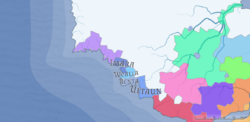Weyon: Difference between revisions
m (→Vowels) |
m (→Consonants) |
||
| Line 80: | Line 80: | ||
! colspan=2 | [[w:Affricate consonant|Affricate]] | ! colspan=2 | [[w:Affricate consonant|Affricate]] | ||
| | | | ||
| | | align="center"| c /t͡s/ | ||
| | | | ||
| align="center"| č /t͡ʃ/ | |||
| | |||
| | | | ||
| | | | ||
Revision as of 10:19, 30 July 2020
| Weyon language | |
|---|---|
| Weyón ela | |
 | |
| Pronunciation | [/we.ˈjɔ́n.ˈè.lɑ/] |
| Created by | Raistas |
| Setting | planet Liifam |
| Ethnicity | Kuoleet |
Settameric languages
| |
Early form | |
Weyon is a group of closely related languages (or dialects of a single language), spoken in the central part of the Kahaaler Mountains to the west of the Northern continent. Weyon forms a dialect continuum from the north to the south, its dialects are divided into four major groups, which are often treated as separate languages, because of a low mutual intelligibility between them. These four groups are: Imára, Wealla, Renta and Últaun. The grammar and the examples used here are from the Wealla group, specifically from a dialect near the town Eraas, but data on other dialects will be given as well. It is spoken by approximately 40,000 people across the central part of the Kahaaler Mountains (Kuola emet) on their western slopes. Imára and Wealla dialect continuum has no clear geographical boundary between these two groups and many Imára traits can be found in eastern parts of the Wealla territory. A similar situation is with some Wealla and Renta dialects, which can have more common traits between each other than with other neighbouring dialects. Últaun, the more obscure dialectal branch, is sometimes included in the Renta group, but it developed its own unique features not shared other branches. All branches still retain a degree of mutual intelligibility, higher than with the closest Weyon relative - the Yiraan language, spoken to the north.
Phonology
Consonants
| Bilabial | Dental | Alveolar | Palatal | Velar | Glottal | |||||
|---|---|---|---|---|---|---|---|---|---|---|
| central | lateral | plain | labialized | |||||||
| Nasal | m | n | ny /ɲ/ | |||||||
| Stop | plain | p | t | ky /c/ | k | kw /kʷ/ | ||||
| aspirated | ph /pʰ/ | th /tʰ/ | kh /kʰ/ | |||||||
| Fricative | f | θ | s | š /ʃ/ | ł /ɬ/ | h | ||||
| Affricate | c /t͡s/ | č /t͡ʃ/ | ||||||||
| Approximant | w | ð | r | l | y /j/ | |||||
All varieties of Weyon have a distinction between aspirated and non-aspirated stops. Imara and Wealla groups retain the phoneme /θ/, which is realized as [ð] between vowels and word-finally and thus these consonants are in the allophonic distribution. In Renta /θ/ disappeared, while /ð/ is a separate phoneme. Most Wealla dialects contrast /l/ with /ɫ/ ("light" and "dark l") and also /n/ with /nˠ/, the "dark" consonants are pronounced longer and are noticeably velarised, compared to their "light" counterparts. Imara dialects merged their sibilants (/t͡ʃ/ and /ʃ/ are the same as /t͡s/ and /s/), which also occured in Renta. Ultaun dialects have the phoneme /ç/ where other dialects have /θ/, which can only appear word-initially. The phoneme /pʰ/ is rare in all dialects, except for Ultaun, other dialects usually have /f/ or /p/ instead.
Vowels
The vowel inventory of Weyon differs significantly from dialect to dialect. The North Weyon dialects underwent vowel mutation, which increased the amount of phonemes, compared to South Weyon, which instead had the southern vowel shift. Thus vowels in cognates can vary greatly between various dialects, for example: the word for "horse" is ilor in Imára, eloor in Wealla, eliir or äliir in Renta and yalin in Ultaun. The Ultaun group differs the most, as it lost the length distinction completely.
|
|
| ||||||||||||||||||||||||||||||||||||||||||||||||||||||||||||||||||||||||||
- The phoneme ä [æ] is only found in a few dialects on the Renta-Últaun border.